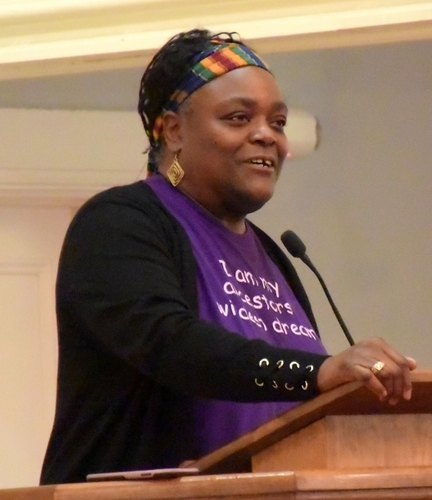BRATTLEBORO — Nearly three years ago, during a Selectboard candidates forum, Curtiss Reed Jr. of the Vermont Partnership for Fairness and Diversity brought up a topic that had remained mostly unnoticed and unspoken: that the town didn't employ a single person of color on its municipal payroll, despite having nearly 9 percent of its citizens identifying as persons of color.
Suitably abashed, the town has been working since then to rectify that.
Town Manager Peter Elwell told the audience at the annual Dr. Martin Luther King Jr. celebration at Centre Congregational Church on Jan. 20 that progress was being made.
Part of that progress was reflected in the keynote speaker he was there to introduce - Dr. Dottie Morris, associate vice president for institutional diversity and equity at Keene State College.
According to Elwell, Morris was recently hired to train all town employees, along with the Selectboard and the town's senior management team.
The year-long process was undertaken “to promote diversity, equity, and inclusion in our town government,” Elwell said.
Elwell said every town employee and manager will have completed a series of workshops - training sessions addressing issues such as unconscious bias and cultural humility - by the end of this month.
“This will establish a shared baseline understanding and vocabulary for our continued work together,” Elwell said.
Next month, Human Resources Director Sally Nix will work with Morris and Dr. Mary Gannon to start an employee diversity and equity committee.
And Reed, the person who started the ball rolling, is now aiding Morris, Gannon, and Nix with the process.
Standing on the shoulders of her elders
“There is a place for all of us at the table, and I don't need to be at the head of it,” Morris told the audience, saying the inspiration that led her to a life devoted to inclusion and social justice came from her elders in Louisiana, where she grew up.
She remembers the crosses that burned in the yard of one of her neighbors, a local NAACP leader. She said she knows viscerally from her childhood years what it like to be hated for the color of your skin.
But she also remembers the strength of her grandmother, “Miss Mattie,” who in the 1950s took the local authorities to court to get title to part of the plantation that her ancestors toiled upon as slaves.
“I have Miss Mattie's blood running through me, so I don't believe that anything is impossible. I have all the faith that we are going to get through all this because we are not going to lay down,” she said.
“In the words of John Lewis, 'You have to be consistent and persistent,'” said Morris.
This year would have marked King's 91st birthday, and Morris said she can't help but wonder “what would he say today, given the current situation of what we're facing over and over again with the lack of compassion shared among people, without the love we need to care for one another.”
King's prescription, said Morris, was what he called “the Beloved Community.” He didn't originate the term, but he popularized the idea of a vision in which all people work together to build a more moral and just world.
“It wasn't a utopia,” she said. “He made it really clear that we should be creating a community of caring, where people care enough to work through the struggles related to complexities of the world in which we live. This would be a world without violence, without oppression, and without injustice.”
The Christian term for this is “agape,” or in King's words, “overflowing love which is purely spontaneous, unmotivated, groundless, and creative,” a love “that does not begin by discriminating between worthy and unworthy people,” and that “makes no distinction between a friend and enemy.”
Morris spoke of 25 traits of the Beloved Community [see sidebar] and spoke of what kind of Vermont we would see if people lived by them. She also spoke of the toxicity of racism, and how it can drive people into self-destructive behavior - that some would rather suffer themselves than see one person of color prosper.
That is why she says she's not going anywhere, that she is determined to see that her adopted home of Vermont is not going to be poisoned by the destructiveness of white supremacy and racism.
“I choose to be here because I love it here, and anything that I love, I am willing to fight for,” she said.
Morris said that we are not going to have peace on Earth “until we recognize the basic fact of our interconnected structure of reality, that we are so dependent on one another. Yet we continue to live with the myth of superiority, that some people are more important than others.”
In Brattleboro, Morris said she is working to “dismantle the system” that reinforces that myth. It will happen, she said, and we will all be better for it.
“As I think about what will happen, we have to keep these things in mind,” she told the audience. “And we will do it because a lie cannot live forever. We'll shine some light on those lies.”
